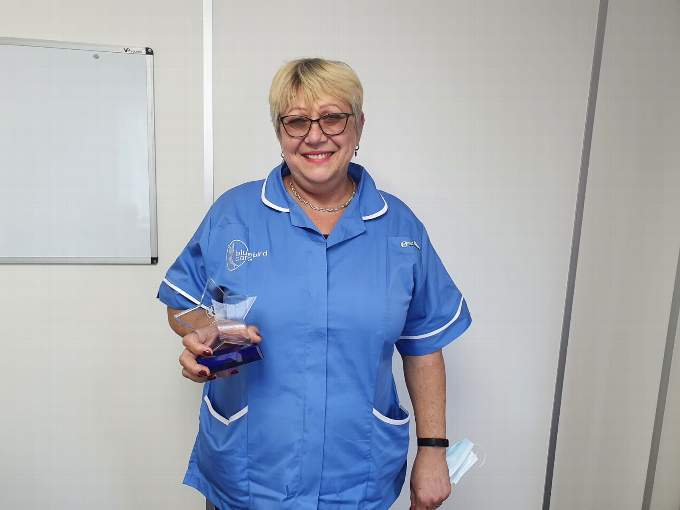By Lucy Caulkett-
Care assistants and supervisors from two home care franchises in South West England are sharing their experience of specialist training to understand first hand, the difficulties of living with dementia.
Bluebird Care Bristol and Bluebird Care Bath & North East Somerset collaborated with Training 2 Care to offer the Dementia Tour, which has been commissioned by 18 NHS Trusts, care homes, police and ambulance services, universities and councils.
Included in the training, participants were made to wear thick mittens to impair their ability to perform tasks or hold items, wear headphones and glasses with altered lenses to impair their vision and make them feel disorientated and operate in dark rooms with coloured lights to add to the disorientation and overall frustration.
The experience allowed Supervisors and Care Assistants at Bluebird Care Bristol and Bristol & North East Somerset the opportunity to experience the difficulties and understand the frustrations that their customers live with.
Michaela Bela, (pictured) a care assistant at Bluebird Care Bristol who undertook the experience, told The Eye Of Media.Com: “The Training 2 Care course gave a profound insight into dementia, as most people cannot imagine what it is like to suffer from dementia . It is quite an experience to be in the shoes of a person that is experiencing dementia on a daily basis.
Bela was the proud winner of the Newcomer of the Year Award last November which recognized a new employee who have shown the most potential and promise in their career over the last twelve months. The Overall Outstanding Care of the Year award is the most prestigious and is awarded to the individual who best strives to provide the highest quality of care
Michael Peachey, associate director for Experience Training at Training 2 Care, said: “At Training 2 Care, we believe that training should lead to positive changes in practice. Experimental training such as the Virtual Dementia Tour, Dementia Interpreter course, and Autism Reality Experience, all help to achieve this.
“Delegates never forget these sessions. The lessons they learn then stay with them forever, and lead to people receiving better care and support. We are incredibly proud to be working in partnership with Bluebird Care Bristol to achieve our joint aim of making transformational changes to the way care is provided.
Alzeimer Disease
Aging is not an inevitable aspect of aging as younger people can also suffer from the ailment. Alzheimer’s disease is the most common type of dementia. Alzheimer’s disease, named after the doctor who first described it, IS found in more than half of people diagnosed with dementia.
The disease causing permanent damage to individual brain cells, due to the build-up of proteins causing Plaques and Tangles. The numbers of damaged cells gradually increase over time, so the brain starts to function less and less well.
People with Alzheimer’s also have a shortage of some important chemicals in their brain. These chemicals help to transmit messages around the brain, so when there is a shortage the signals are not transmitted as effectively.
The decline can be cumulative, usually affecting short–term memory first, then extending to everyday tasks.
Vascular dementia is the second most common type of dementia, occurring when the blood supply to the brain is damaged or cut off, and killing some brain cells. This can happen either suddenly, following a stroke, or more gradually after a series of ‘mini–strokes’ or ‘infarcts’. These mini– strokes can be so small that they go unnoticed to begin with.
Vascular dementia can also be caused by thickening of the walls of blood vessels in the brain, where the walls of these become thickened which in turn reduces the blood flow through the brain. With vascular dementia, people start to forget things and find day–to–day life harder to cope with. Vascular dementia can affect mobility and co-ordination more so, and symptoms can progress in a stepped development.
Care assistants who cater for those suffering from dementia also specialize in professionally helping children within the family setting of affected adults adapt to sudden news of having to deal with the sudden onset of dementia in a family member and coping with all the challenges that come with it.




